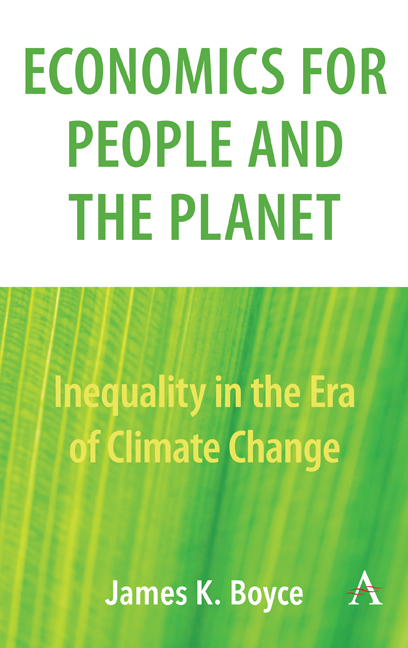Book contents
- Frontmatter
- Contents
- List of Illustrations
- Acknowledgements
- Part I Rethinking Economics and the Environment
- Chapter 1 Limits to Growth–of What?
- Chapter 2 The Twin Tragedies of Open Access
- Chapter 3 Pursuing Profits–or Power?
- Chapter 4 Rent in a Warming World
- Chapter 5 Universal Assets for Universal Income
- Chapter 6 Universal Basic Income: Six Questions
- Chapter 7 Environmentalism's Original Sin
- Chapter 8 Rethinking Extinction
- Part II Environmental Injustice
- Part III Climate Policy
- Notes
- Publication History
- Index
Chapter 2 - The Twin Tragedies of Open Access
from Part I - Rethinking Economics and the Environment
Published online by Cambridge University Press: 12 February 2019
- Frontmatter
- Contents
- List of Illustrations
- Acknowledgements
- Part I Rethinking Economics and the Environment
- Chapter 1 Limits to Growth–of What?
- Chapter 2 The Twin Tragedies of Open Access
- Chapter 3 Pursuing Profits–or Power?
- Chapter 4 Rent in a Warming World
- Chapter 5 Universal Assets for Universal Income
- Chapter 6 Universal Basic Income: Six Questions
- Chapter 7 Environmentalism's Original Sin
- Chapter 8 Rethinking Extinction
- Part II Environmental Injustice
- Part III Climate Policy
- Notes
- Publication History
- Index
Summary
Open access–in the sense of a complete absence of property rights and regulations–leads not only to the abuse of natural resources but also to the abuse of the poor by the rich. Climate change is a case in point.
To combat global warming, we must confront two tragedies of open access. The first is sometimes called the ‘tragedy of the commons’, a misnomer since societies often devise rules to manage common property sustainably. This tragedy is that when there is open access to a scarce resource, individuals have no incentive to conserve it and instead will overexploit it even to the point of collapse. In the case of climate change, the scarce resource is the limited capacity of the biosphere to absorb and recycle our emissions of carbon dioxide and other greenhouse gases.
The second tragedy of open access is less widely recognized but no less real. Although in theory open-access resources are equally available to all, in practice some people are, in George Orwell's haunting phrase, ‘more equal than others’. Open access often generates short-run benefits for those who least need them and long-run costs for those who can least afford them. Global warming is a good example. Rich countries burn more fossil fuels than do poor countries, generating more carbon dioxide emissions. And within any given country, richer people benefit most from the fossil-fuelled economy by virtue of the fact that they consume more goods and services.
Meanwhile, it is poor countries and poor people who stand to bear the greatest costs of global warming. They are less able to invest in air conditioners, sea walls and other adaptations. They live closer to the edge: while the rich can weather a 20 per cent decline in their real incomes with relative ease, for the poor the same decline may push them over the margin between life and death. And the places that climate models show will be hit hardest by global warming–including drought-prone regions of sub-Saharan Africa and typhoon-vulnerable South and South East Asia–are home to some of the world's poorest people.
- Type
- Chapter
- Information
- Economics for People and the PlanetInequality in the Era of Climate Change, pp. 7 - 8Publisher: Anthem PressPrint publication year: 2019



